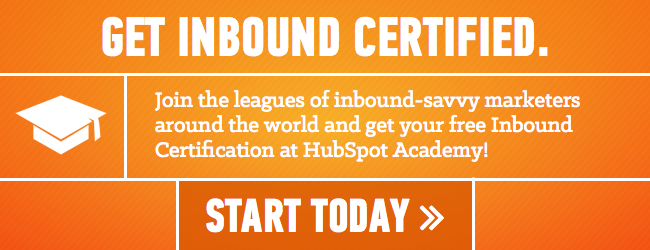 Whether you’re new to the block or a veteran marketer, you conceptually know that the first step in any successful inbound strategy is to attract strangers to visit your site. But actually putting it into practice can be hard. You're worried about lots of other things like getting bottom-line results or keeping up with the latest marketing trends, so it's easy to forget about that initial step.
Whether you’re new to the block or a veteran marketer, you conceptually know that the first step in any successful inbound strategy is to attract strangers to visit your site. But actually putting it into practice can be hard. You're worried about lots of other things like getting bottom-line results or keeping up with the latest marketing trends, so it's easy to forget about that initial step.
但这不应该是您营销中被遗忘的一部分。使其成为营销策略优先考虑的关键是停止相信产生流量是不可能的。网站流量的增加和访问者不像玩轮盘赌 - 人们有几种久经考验的方法。为了确保您了解这些技巧,我们已经在下面的帖子中分解了一些最佳的方式,您可以在网站上产生流量。
1) Optimize your website for "searchers."
When you hear the term “SEO” or “search engine optimization,” who do you think that implies you should be optimizing your site for? Well, I’ll give you a hint:it’s not search engines。In fact, great websites aren’t optimized for search engines --他们使用搜索引擎为人们进行了优化。
But here’s the good news: Search engines consider sites optimized for searchers to be fully optimized, as well. So by optimizing your website for the actual people coming to visit it, you’re killing two birds with one stone and simultaneously optimizing it for search engines, as well.
So when you think about creating a website experience that will attract more visitors to your site, be sure you’re first thinking about the searchers themselves. What do they want to see? What are they looking for help with? How can you best serve them? If you create a website optimized for searchers, search engines will follow.
2) Create content using the right keywords.
Your keywords are like bridges. They're the reason anonymous searchers can get to your website. But in order for searchers to make the trek across those bridges and actually visit your site, they have to be interested in the content behind the search listing.
The best way to know what those searchers want is to know your personas -- since it’s your personas who are the searchers you’re trying to attract. Keywords focused on the problems that your personas face or the goals they’re hoping to achieve are what you should be creating content about. Why? Because people are actively looking for solutions to those problems. If you have content that helps solves their problems, searchers will find and visit your site.
3)确保您的网站提供认知流利的体验。
想象一下,您希望找到一名律师,以帮助您为最新发明提供专利。您进入Google,然后将“专利律师波士顿MA”键入搜索栏。
Before you click "search," stop. What do you imagine those patent lawyers’ websites will look like? The picture in your head probably isn’t one of a cluttered site outfitted in neon colors and fun fonts. Instead, when you imagine what a good, trustworthy patent lawyers’ website might look like, it probably uses more muted tones, a cleaner font, and presents opportunities for you to explore the different services the practice offers probably comes to mind.
Sure enough, after you've done your research, the patent lawyer you end up hiring probably has a website that looks a lot like your initial cognitive concept of what a good lawyer’s website should look like.
This concept is known as cognitive fluency: websites that attract more traffic tend to present an experience that’s similar to visitors’ ideas of what the website should look like.
A simple fix to improve the cognitive fluency of your site is to actually ask your personas (usually your current customers) what they’d expect to see on a site like yours. What style and formatting do they expect? What content should be front-and-center? Then, if your website doesn't match their wishes, it might be time tolook into additional website optimization strategies。
4) Write blog posts on topics people need answers to.
不仅仅是网站页面可以帮助您吸引网站的流量 - 您的博客可能是吸引新访问者所必须的最强大的工具之一。就像您应该围绕购买者正在搜索的关键字优化网站页面一样,您也应该在博客文章中做同样的事情。您的角色最常见的问题是什么?他们面临哪些问题,正在互联网上寻求帮助?这些是您的博客文章主题。
编写与您的角色相关的博客文章并回答他们的问题,以便当您的角色搜索这些条款时,您的网站会出现在他们面前。这不仅将有助于下次搜索者寻求帮助时保持您的网站和业务最高点,而且还有助于与潜在的买家建立信任。
5)为每个最相关的关键字创建一个单独的帖子。
Your keyword footprint is a little bit like your carbon footprint, except on the internet. Your keyword footprint is the catalog of keywords your website ranks for on search engines -- basically how big of a mark you leave on the internet. Unlike a carbon footprint, having a large keyword footprint is actually a very good thing! Why? Because having a large keyword footprint means your website ranks for and is associated with many different keywords -- and each of those keywords is an opportunity for your website to get discovered.
Because each blog post you write is viewed by search engines as its own individual website page, the more quality blog posts you write about the keywords that are most relevant to your persona, the more chances you have to rank for those keywords and show up on search engine result pages. Blog posts help grow your keyword footprint and thus your opportunity to get found and attract visitors to your site.
6)定期发布博客内容。
It’s not enough to just blog about keywords that are relevant to your personas: If you want to attract visitors to drive sustained traffic to your side, you have to keep blogging一贯。
In the2013年入站营销报告,我们发现businesses that blog daily are almost 70% more likely to report a positive return-on-investment than businesses that blog only once a month。What means for you is that blogging on a regular basis can produce big benefits -- benefits in the form of more visitors, leads, and even customers.
博客定期给搜索引擎reason to crawl your website on a regular basis -- again, giving you more opportunities for those search engines to discover your pages, index them, and serve those pages up on search engine result pages.
7)使用博客内容在社交媒体上回答潜在客户的问题。
您是否曾经见过有人在Twitter或Facebook上寻求建议?也许他们在推特上提出了建议在您的城市用餐地点的建议,或者发布了有关购买哪种牙膏品牌的问题。在您属于的LinkedIn组中有人问一个问题呢?您已经看到了它们...但是您回答了吗?
What would you have done if someone asked you those same questions in person? Would you walk away and pretend you never heard them? No -- you’d answer them! You’d provide that person with the information they were looking for and act as a resource for them.
同样的概念可以在社交媒体上起作用:如果陌生人或潜在客户正在寻求帮助,不要只是浏览他们的评论或问题 - 帮助他们!寻找您的行业知识可以提供帮助的机会。回复社交媒体帖子和查询,但又一步一步,在这些回复中包含相关的博客文章或网站页面。这样,那些陌生人和前景不仅获得了他们正在寻找的帮助,而且您还可以吸引新的访客进入您的网站。只要您不仅向人们垃圾邮件链接到您的网站 - 实际上是在帮助他们 - 这可能是一个很好的策略。
8)监视社交媒体上的相关关键字,并在您的帮助下参与其中。
You can’t share helpful content with strangers or prospects on social media if you don’t know they’re looking for it. So, use social media monitoring to keep an eye on those keywords most important to your business -- and see how you can help the people using them. (If you're a HubSpot customer usingSocial Inbox, you can even get alerts whenever people tweet these keywords.)
Listen on various social media networks for mentions of the biggest problems your persona face. When you see those conversations taking place, look for opportunities to get involved -- just like you would in the previous scenario when people were asking questions. By listening for the keywords that are most important for your business, you can contribute your two cents (and content) in the right place at the right time.
By following these simple strategies, you can attract the正确的陌生人 - 您的买家角色 - 访问您的网站。一旦您有了这些访客,好吧,将他们转换为潜在客户,养育和关闭客户并将他们带入促销员只是时间问题。但要记住:一切都从拥有正确的流量开始。
Want to learn more about any of the tactics discussed above or dive deeper into other strategies for attracting the right visitors to your site?Check out HubSpot Academy’s free Inbound Certification program呢
最初发布于2014年5月8日上午8:00:00,2019年10月30日更新
话题:
SEODon't forget to share this post!
Related Articles



Expand Offer
Social Media Content Calendar Template
现在就得到